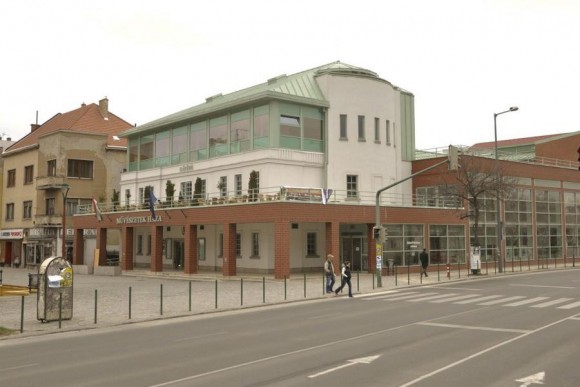TIBOR BIRO: The Urania and Beke Cinemas are located in the Miskolc House of Arts, build in the 1930's. It originally functioned as a cinema, first under the name Urania (the muse) and later, following World War II, it was renamed Beke (the Hungarian word for "peace"). There was another cinema nearby which the capacity to seat 780, but as it was in poor condition and as local multiplexes were opening in 2000, it was closed. Since that time, we have been operating this cinema with two screening rooms. In 2006, the cinemas were renovated and rebuilt to fit the cultural needs of the city; now the building has a great concert hall of 600 seats, a gallery for exhibitions, and two smaller cinemas (of 70 and 140 seats). We screen two films every day in both screening rooms. Most of our operational expenses are covered by the local government as the state support system has been changed and cinemas are not granted any support. For this reason, many smaller cinemas had to be closed. We solved this problem by changing our profile for one of our screens; starting in 2010, we also screen successful movies in the larger room in order to increase our box office.
What is the challenge of funning a cinema such as yours?
Regarding this region, in the narrower sense, we are the only art cinema here that can offer an alternative to the film content of the multiplex cinemas. However, we have to face the problem that art film supply is very poor.
What kind of films do you prefer to screen, and why?
I think that it is very important to screen the newest films of the great directors, and also art movies that attract relatively big audiences (such as The Queen or The King's Speech). These are films which interest many people, just like the commercial ones, but at the same time they also transmit values.
The cinema is home to many festivals, events and film weeks. Why are these important and what do they achieve?
We started Jameson CineFest Miskolc International Film Festival 8 years ago and by now it has become so extensive that we have to manage its organisation all year round. Thus running the cinema is only secondary. We expect events such as CineFest, Polish film week, French film week, film clubs, filmmaker-audience meetings, etc. to encourage more people to come to the cinema, and that is why we continue these programmes. It is always easier to convince younger people watch films in the cinema. At these screenings one can watch a film that is not on the typical cinema programme.
What is the role of Europa Cinemas for cinemas such as yours, and why is it important?
In 2000, when two multiplex cinemas opened at the same time in Miskolc, we had to basically change our film structure, and we decided to follow the foreign examples: to set up our film programme from national and art films. This idea fell in with the aims of Europa Cinemas. We were the first among the Hungarian cinemas in the countryside, outside Budapest, who could become members - with the help of Eurimages, at that time.
At the present, the support of Europa Cinemas is essential to our operation. At their annual conference, we have the possibility to discuss the current problems and to learn about new ideas as well. Europa Cinemas has a very important role in such initiatives as, for example, the Europa Cinemas Label award of the professional support provided to the operation of national networks.
How does a cinema like yours serve the local community?
We always aim to screen precious films at a very friendly price. (The entrance fee is very cheap, even by Hungarian standards: 500 Ft, approximately 1.8 euros.) We have to improve our relationship with schools, but during this year's CineFest we held a networking conference on the topic of "Young Audiences and the Cinema," and we heard many good ideas that we could utilize in the future.
What about the upcoming digitalisation of cinemas? How will it affect your work and your cinema?
In a few years' time, digitalised techniques will have a definitive role - and for this reason a tender has recently been launched in Hungary for equipping 8 - 10 cinemas with projectors suitable for the DCI standard. Almost all multiplexes are already equipped with such machines, so this tender means the first step toward making ordinary cinemas able to use such technical equipment. We are going to enter the tender, as we could use such a projector not only at regular screenings, but also during the international film festival; we have to use a projector now that we have borrowed. Of course, the technical equipment in itself is not enough; we hope that when films will be screened only from digital copies, that the film supply will also become significantly wider.




















